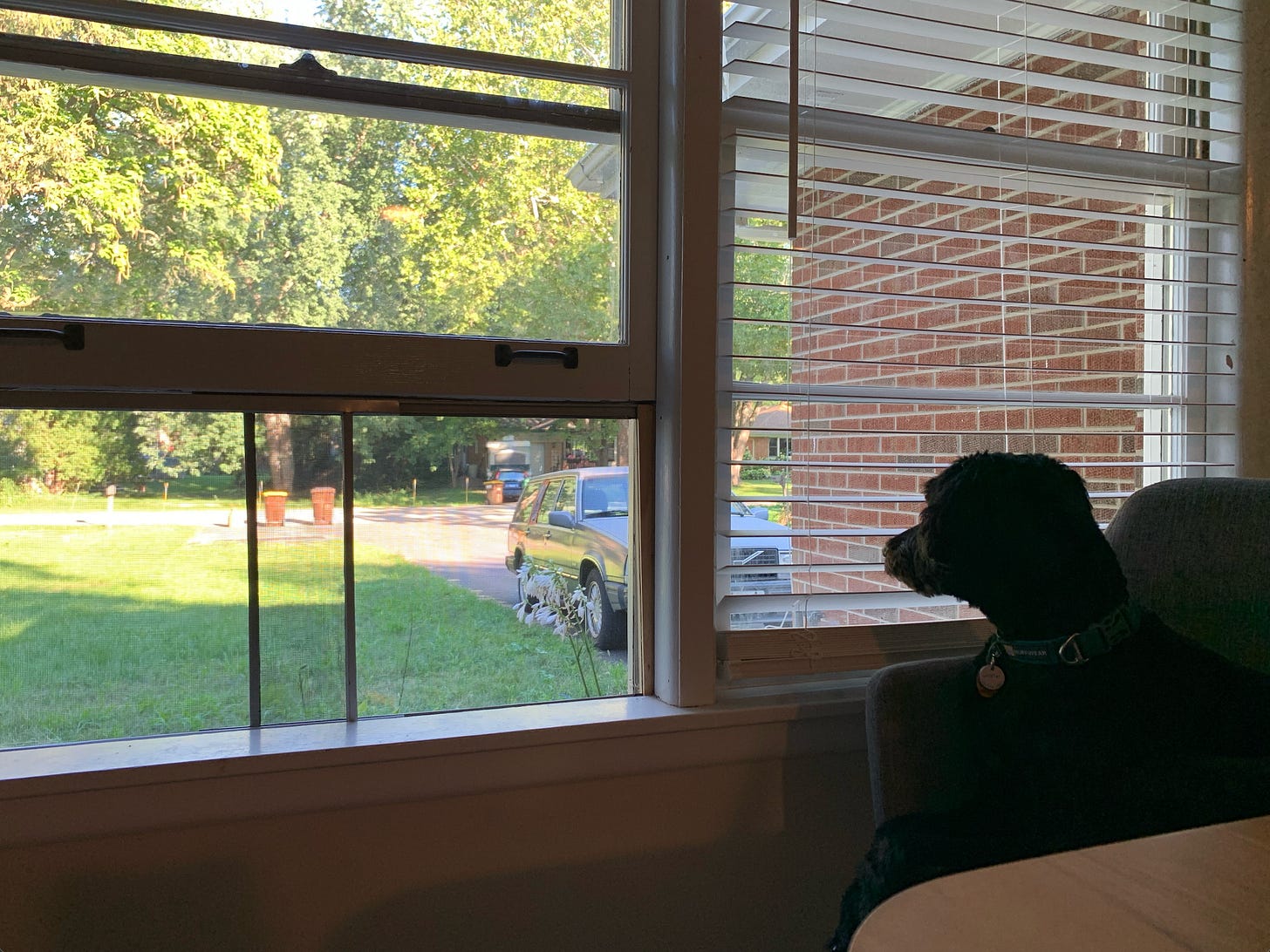Should I build myself a writing shed?
George Saunders has one, and that may be good enough for me.

No. 92: Should I build myself a writing shed?
The places where writers write has always fascinated me.
Does it change the way they write?
Are they faster and more efficient depending on their surroundings?
Do they feel more creative in one space versus another?
I read somewhere that Ray Bradbury wrote his novel Fahrenheit 451 at a library. He had a big family, which meant a crowded house, which meant hunting for somewhere a little more tranquil to do his scribbling.
He sort of found that place in the basement of a UCLA library. Following the characteristic sound of typewriters, he discovered a room with twelve of them. Students were hammering away at the keys like crazy, and for good reason.
The typewriters were coin-operated.
The deal was, you inserted a dime for thirty minutes of typing. This apparently fit the bill for the young author. He went to the bank and came back with a bag full of dimes. Nine days and ten dollars later, he finished the short story that would become his award-winning novel.
Then there was J.D. Salinger, the first writer I’d heard of that used a writing shed. Not only that, he had a writing outfit. Whenever he was going to write or meditate, he wore one-piece jumpsuit, the same kind a mechanic puts on before crawling under your car.
I used to love Catcher in the Rye. Now? It’s alright. I still love Salinger’s books about the Glass family, especially Franny and Zooey. But when I found out about his courtship of an 18-year-old girl when he was 53? Yeah, that freaked me out.
Regardless of his questionable life choices—and here I’m going to skirt the age old question of separating art from artist—I couldn’t get the image out of my head of the writer at work in the absolute privacy of a dimly lit shed.
And then there was the navy blue jumpsuit.
It’s kind of the perfect uniform when your task is dealing with the nuts and bolts, springs and lifters, grease and grime of the story. Because aren’t stories just little machines? The work of the writer is to put them together, tune them up, then set them going like a self-winding watch. They’ll run forever on their own steam if made correctly, and Salinger was ready, in his own unique way, to take on that job. The writing shed was his garage, a place to keep the tools, take apart and put back together again the tiniest mechanisms. With an allotted space for story making, there was no risk of dirtying the objects of his ordinary life, or letting the objects of ordinary life dirty his delicate projects.
I’ve never had a writing shed. I’ve never even set aside a dedicated place to write. I’ve had the opportunity, but I haven’t taken it. Actually, I’ve been unable to take it.
The proof is in the two rooms that are open for business in our house. One is three-windowed and looks out onto the backyard. It would make a great writing den, which was my plan when we moved in. But as always I ended up back where I started.
The kitchen table.
I’ve tried to pin down what it is about the kitchen table that I like so much.
The most obvious thing? It’s huge. I can scatter books and coffee mugs and magazines and hot sauce and notebooks and car keys and plates all over place. I like being surrounded by a certain amount of stuff. Not too much, but not too little. When the table is cleared, it feels empty and I feel weird.
I also like that the kitchen is in center of the house, something true of most houses. I get to see Grace when she passes through or makes something to eat, which usually means I get something to eat, too. When she’s not feeling like feeding the needy, I can easily get up and pick through the refrigerator. Water is close by when thirst strikes. Most of the time my dog sits on a chair next to me. There’s two big windows next to the table where he and I look out onto the street, and I can open them for dose of fresh air direct to the nostrils whenever need be.

Besides those reasons? There’s a pretty simple one.
Kitchens are in houses and in houses there are bathrooms.
So, there’s that.
But all the reasons listed above for why Writing at the Kitchen Table is Good can be easily flipped into negatives. The stuff on the table, the central location, even the bathroom, that sanctum for endless scrolling through my phone, could be seen as bunch of distractions preventing me from achieving Bradbury levels of efficiency.
And I will say. Once, while on a four-hour fight with nothing to entertain me but a blank Google Doc, I wrote one of the pieces I’m proudest of and in record time.
But why, randomly, am I raising the writing shed question now? Haven’t I been, like, writing for years, shedless?
Mark Twain, Roald Dahl, George Bernard Shaw, Henry David Thoreau, and Virginia Woolf had writing sheds, too.
It’s not exactly the hot new thing.
At least it wasn’t.
Then I learned George Saunders a.k.a. one of the writers that inspires me the most has a writing shed. And now, for me, it definitely is the hot new thing.
If George Saunders has one, don’t I need one too? Won’t I, like, automatically become a bestseller if I do precisely what he does?
The answer is clearly yes.
I didn’t have old George pegged as the writing shed type. When he recently shared a picture of his wooden shed in Syracuse—or, his ex-shed, since he’s moving to California, where he seems to also have a shed—I wanted to learn more.

Based on what I’ve read from him, he often talks about how, in his early days, he wrote whenever, wherever he could. Most of the time that was at the corporate office where he worked before he became a World Famous Author.
This resonated.
I, like that earlier George, am a guerrilla writer, making my attacks whenever the opportunity arises.
But maybe with increased success came increased time to write came increased usefulness of a writing shed?
The George Saunders situation doesn’t really clear things up, but it does pique my interest. I know he can write with the strength of a thousand banshees with or without a writing shed. So, writing shed needed or not?
Like most everything, there is probably only one way to find out.
By building one.
Time is running out if I want to do this. My first Midwestern winter will be coming down on me with the sharpness of a long icicle sooner that I’d like to admit.
And really, it doesn’t sound half bad for a fall season project. I can see the scene now. Flannel shirt, denim pants, red and orange leaves drifting down from the trees. The smell of fresh lumber mingling with the scent of decomposing leaves, sweetening the air. I’ll carry a hammer around and hit things, stopping only to sip dark beers.
But I’d be lying if I didn’t have a few concerns about writing shed life.
What if I get hungry out there?
What if I need water?
How will I stay warm?
And most importantly, does a writing shed mean the end of waking up in the morning and writing in my boxers?
I don’t want to trudge through snow in my skivvies—even if the walk is short, even if it is, theoretically, possible.
Perhaps within this question lies the secret to great writing. That is, don’t write in your underwear. Or, if the whole writing shed thing goes south, do?
I’m looking up navy blue jumpsuits on Amazon right now. ♦
Weekly Three
HEAR: “Audrey” by Dave Brubeck
READ: Author Mary Gaitskill writes about two stories that focus on death.
VIEW: Photos from my beautiful evening bike ride last night.



Let George be George and you be you. But since I always have an opinion, I'll say this: you seem to know what you like, and what you like is that kitchen table. Productivity is a result of mindset and motivation, not location. I have a home office to write in, but 90 percent of the time you'll find me in the living room or elsewhere. I like to move around. If I had to heat a shed and traipse outside in the cold to use it, I wouldn't. So I guess be realistic about your habits and you'll have your answer. And think of all the writing time you'd lose while building the thing!
All that said, I understand the appeal of that perfect little private place; I've salivated over plenty of them. But if I had one, I bet I'd still bounce around the house.
I have always wanted a shed, but realistically unless it was of good construction, and warm in winter it would probably be counter productive. It’s probably just a romantic notion, unless there is nowhere else to write that allows concentration.